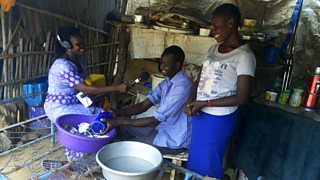ΒιΆΉΤΌΕΔwork vs Housework: gender roles and girls education in South Sudan
Kenyi Betuel
Editor, Our School, South Sudan
Tagged with:
Gender roles are often the reason girls drop out of school in South Sudan. We produce radio show 'Our School' to amplify issues and barriers to girls education across the country so they can be discussed and overcome. Our editor shares a very unusual story of a young boy turning the tables on gender stereotypes.
"Yes, I help my sister sometimes in sweeping, washing utensils and even sometimes we cook together" says Emmanuel happily, while busy doing some chores at his home in Juba.
He's speaking with producer Florence Michael for radio programme 'Our School', the interview is for an episode exploring gender roles and how they differ for boys and girls - both at home and at school.
"It helps us if we work together then we shall do the work quickly and then we go to read. Even if we are given exams we shall then perform well," he said.

Sida Florence Michael, a producer for 'Our School' interviewing Emmanuel
But Emmanuel's story is uncommon. Many people in South Sudan believe a girl should be doing the domestic chores such as cooking, fetching water and collecting firewood whilst the boys look after the animals, go hunting or build huts. These attitudes originate from beliefs that women are weak and men strong - and these roles defined by gender are entrenched beyond the home and even into schools.
Emmanuel's mother, Doruka says she appreciates that her son does chores which are traditionally given to girls to do. "My son Emmanuel likes helping his sisters with work at home and even me his mother. He sweeps, even washes utensils, he cooks too and they do their work equally."
She goes on to stress why her children sharing the chores is beneficial, saying "they work equally, it means they all get time for their studies. This makes his sisters very happy that they are not being discriminated against."
She told our producer she brought up and taught her children to work together from early childhood and hopes more is also done by schools to ensure tasks given to girls and boys are divided equally, and not decided by gender.
In some schools girls are often pulled from class to assist with jobs, such as making breakfast or lunch for teachers or fetching water while boys stay in lessons or play.
Challenging discrimination in schools
In the same episode, we interviewed Head Teacher, Sipura Kiden in Juba who says she now assigns the same tasks to pupils at her school regardless of gender. "During the hot days we ask boys and girls to dig the holes for the iron poles for the sunshades, so that people can sit under shade. The pupils - both boys and girls - dig the holes" she says.
In Yambio, when we aired a programme in Zande language about girls being called out of the classroom to cook (whilst others remain in the lesson), a male school teacher called into the show saying "it is totally wrong to send a pupil to the kitchen while you are teaching others in the class, if I want to give work to students it will be when there is no lesson because all of them paid to come and learn."
On behalf of teachers he continued to have his say "I am appealing to school administrations for equality in the schools, if there is work to be done it should be given to both boys and girls.''
It was rewarding that our programmes are inspiring support for change by showing listeners how people like Sipura and Emmanuel are challenging gender norms - and leading by example to bring about positive change.
Pressing for progress
After this show I spoke with Florence about growing up in South Sudan and the impact of gender discrimination on her life. She described gunshots at her school, the fear of attending and the social and cultural norms which all stack against girls completing their education. In her childhood, she said she was doing all the work "meant for girls" and her brothers did the work "meant for boys".
She said it was refreshing to help listeners connect with a young (and male!) role model, who broke the mould. "I've been inspired by some men and boys who do share work equally with their wives or sisters to make sure that girls are not overworked and can study," she says.
Through 'Our School' we're reaching many different girls, some who have dropped out of school, but decided to return because they now understand the importance of education after listening to the programme. I'm happy that Emmanuel's story helped people hear about the issues girls face from a different perspective - and show how and why change is a good thing whatever your gender.
--
'Our School' - funded by DFID through the Girls' Education South Sudan (GESS) project is produced by team of local producers and broadcasts in nine languages.
